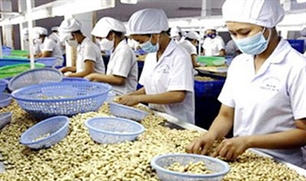A third scenario for national economy?
The view was shared by economic experts at a forum on export opportunities and prospects in 2012 held in Ho Chi Minh City on May 18.
Dr Vo Tri Thanh, deputy director of the Central Institute for Economic Management (CIEM), noted that despite the global economic slowdown, Vietnam’s exports in the past four months have sustained impressive growth of 22 percent thanks to their highly competitive advantages. Foreigners use Vietnamese products because they are essential consumer goods and offered at low prices.
Thanh was even confident that
with the four-month export growth of 22 percent, Vietnam will probably achieve its
set target of obtaining an annual export growth rate of 12-13 percent this
year. 
However, he reminded export businesses to improve their competitive capacity, citing that foreign direct investment businesses secured export growth of up to 36 percent, while domestic businesses posted 4.4 percent in the first four months.
Tran Xuan Gia, former Minister of Planning and Investment, raised concerns over the ailing economy, saying it is showing signs of steep deceleration despite low inflation, high export growth and stable foreign reserves.
According to his explanation, social investment capital in the first quarter of this year was much lower than in the same period last year. Business demand for bank loans is decreasing considerably due to stagnant production. The purchasing power of the market is also falling, and the number of businesses have been dissolved or suspended is increasing dramatically.
In addition, he said a sharp fall in import surplus is putting pressure on exports for 2013 and in the following years. He quoted the latest statistics as saying the four-month trade deficit at just US$176 million, or 0.53 percent of exports, is rather low, indicating stagnation in investment and production.
Gia suggested that the government take immediate action to halt economic deceleration – an important prerequisite to stabilising the macroeconomy and containing inflation.
Saving businesses means saving the economy, Gia declared at the forum, adding that the government should act immediately to support businesses. But he also said businesses should act first by restructuring themselves before the government helps them out.
Removing unnecessary fees
Gia welcomed the government’s decision to announce tax support for businesses, yet suggested that the government particularly focus on helping businesses reduce production costs by removing age-old fees, exempting or slashing others, and delaying new ones.
To this end, according to the former investment minister, the government should review all direct and indirect fees imposed on businesses and individuals to come up with the proper decisions.
Other experts recommended that the government should restructure business debts, or even guarantee their bad debts to ease business demand for bank loans.
They pointed out that although the government has lowered the interest rates, the rates still remain high, making it impossible for businesses to take out loans.
Bank representatives said that commercial banks want to lend to businesses to make a profit, but at the moment many do not, even though they have an adequate supply of capital at hand. They said like other businesses, they need to tackle their own bad debts first before opening the door to producers.
The crux of the matter is to address the issue of bad debts as soon as possible to iron out snags for processors and exporters, said the experts.
VOV
 Private economic sector joins up developing Binh Duong
Private economic sector joins up developing Binh Duong
 Enterprises resuming operations up 25% in nine months
Enterprises resuming operations up 25% in nine months
 Bright prospects for exports to set new record in 2024: Experts
Bright prospects for exports to set new record in 2024: Experts
 Steps for green development strategy concretized
Steps for green development strategy concretized
 Phu Giao bound for sustainable development
Phu Giao bound for sustainable development
 Building Binh Duong into a regional connectivity hub
Building Binh Duong into a regional connectivity hub
 PM demands special mechanisms for Noth - South high-speed railway project
PM demands special mechanisms for Noth - South high-speed railway project
 Listening, solving problems, supporting enterprises to develop
Listening, solving problems, supporting enterprises to develop
 Bau Bang district Association of Women coordinates to introduce and connect OCOP
Bau Bang district Association of Women coordinates to introduce and connect OCOP
 Towards sustainable economy
Towards sustainable economy







